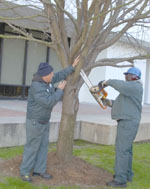What happened to the trees?
 Tim Farmer,
top photo, grounds
maintenance, digs a trench for the new irrigation system required
for the new dogwoods, oaks, and tulip trees (Japanese Magnolia) that
will adorn the Basic Science Building. The Bradford pear trees, once
located there, were removed recently because of their age and sickly
state. Bradford pears grow well for 12 to 15 years before becoming too
large and splitting under the weight of heavy branches. Although soft
wood trees, Bradford pears grow more similar to a hard wood tree,
meaning that all the limbs spread from a central point in the tree’s
trunk. When the trees reach the end of their life span, they split and
become a danger to those who might walk or sit near them. With the new,
total coverage irrigation system in place, the colorful dogwoods,
overcup oaks, and tulip trees should thrive along with several other
plants including a pinkish red flower called lorotetalum and Indian
hawthorne.
Tim Farmer,
top photo, grounds
maintenance, digs a trench for the new irrigation system required
for the new dogwoods, oaks, and tulip trees (Japanese Magnolia) that
will adorn the Basic Science Building. The Bradford pear trees, once
located there, were removed recently because of their age and sickly
state. Bradford pears grow well for 12 to 15 years before becoming too
large and splitting under the weight of heavy branches. Although soft
wood trees, Bradford pears grow more similar to a hard wood tree,
meaning that all the limbs spread from a central point in the tree’s
trunk. When the trees reach the end of their life span, they split and
become a danger to those who might walk or sit near them. With the new,
total coverage irrigation system in place, the colorful dogwoods,
overcup oaks, and tulip trees should thrive along with several other
plants including a pinkish red flower called lorotetalum and Indian
hawthorne.  Left photo: George
Melfi, left, and Isiah White, grounds maintenance,
prepare to cut down the last Bradford pear in order to ensure the
safety of everyone on campus from splitting limbs. There are
other benefits as well, according to Tom Thurman, grounds
superintendent, “I love color, and this new landscaping is going to be
so much prettier, but it also means that there won’t be limbs hitting
the building anymore and no more fungus growing on the building because
of the cover from the Bradford pears. The new trees will offer just
enough shade, and it really is going to be beautiful.”
Left photo: George
Melfi, left, and Isiah White, grounds maintenance,
prepare to cut down the last Bradford pear in order to ensure the
safety of everyone on campus from splitting limbs. There are
other benefits as well, according to Tom Thurman, grounds
superintendent, “I love color, and this new landscaping is going to be
so much prettier, but it also means that there won’t be limbs hitting
the building anymore and no more fungus growing on the building because
of the cover from the Bradford pears. The new trees will offer just
enough shade, and it really is going to be beautiful.” Friday, Feb. 17, 2006
Catalyst Online is published weekly,
updated
as needed and improved from time to time by the MUSC Office of Public
Relations
for the faculty, employees and students of the Medical University of
South
Carolina. Catalyst Online editor, Kim Draughn, can be reached at
792-4107
or by email, catalyst@musc.edu. Editorial copy can be submitted to
Catalyst
Online and to The Catalyst in print by fax, 792-6723, or by email to
catalyst@musc.edu. To place an ad in The Catalyst hardcopy, call
Community
Press at 849-1778, ext. 201.